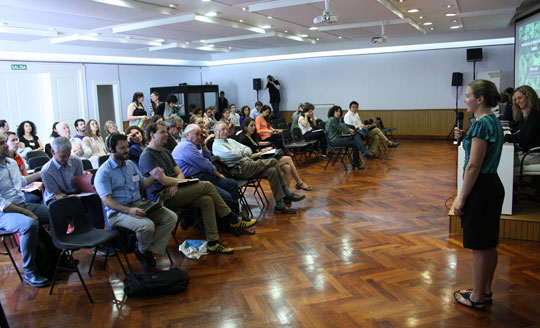by Claire Luby, Open Source Seed Initiative (OSSI)
Claire Luby presented her work at the STEPS América Latina launch event in November 2015, as part of a panel on ‘horizontal innovations towards sustainability’. In this blogpost, Claire reflects on the impacts of property regimes on plant diversity, and what OSSI is doing to promote a sharing ethic among farmers, plant breeders and scientists.

In recent years, the exchange of plant diversity among plant breeders and the ability of farmers to save seed have been rapidly eroded by the extension of various forms of intellectual property rights.
As I explained at the STEPS América Latina launch, what is at stake is access to the plant genetic material that will be needed to breed crop varieties capable of supporting a resilient agricultural system.
Sharing, not exclusion
We need to increase, not narrow, the availability of genetic resources and technical options. We need innovative plant breeding that produces resilient and productive cultivars adapted to thousands of specific places in a rapidly changing biosphere. We need to revitalize public plant breeding. We need to integrate the skills and capacities of farmers with those of plant scientists. And we need to recover, reinforce, and expand an ethic of sharing – rather than exclusion – in germplasm exchange.
The Open Source Seed Initiative (OSSI) was developed to address these concerns. The main goals of OSSI are to create a ‘protected commons’ around plant germplasm and maintain access to and sharing of diverse genetic resources.
OSSI seeks to enhance the broadest possible awareness and understanding of the critical issue of access to plant genetic resources. We are engaged in education and outreach that promotes sharing rather than restricting access to germplasm, revitalizing public plant breeding, integrating the skills and capacities of farmers with those of plant scientists, recognizing the work of plant breeders of all kinds, and supporting a diversified seed industry.
Using a pledge to promote sharing
A key tool for achieving these goals is development of a pledge to preserve the unencumbered exchange of plant germplasm for breeding and research purposes and the right of farmers to save and replant seed. OSSI is committed to building a branded, ethical framework that farmers, breeders, and communities may freely choose to employ in order to ensure the availability of their varieties to this and future generations.
The Pledge reads:
“You have the freedom to use these OSSI-Pledged seeds in any way you choose. In return, you pledge not to restrict others’ use of these seeds or their derivatives by patents or other means, and to include this pledge with any transfer of these seeds or their derivatives.”
We do not yet know the impact that OSSI will have on increasing innovation in plant breeding and ensuring the ability of farmers to access crops that are best suited to their farms, but we are working to establish networks both within the US and internationally with the hope that we can facilitate the sharing and exchange of plant diversity. The STEPS América Latina meeting was an excellent opportunity to exchange ideas across borders and work toward sustainable development.
Photo: Claire Luby presentation / STEPS Centre (Creative Commons)